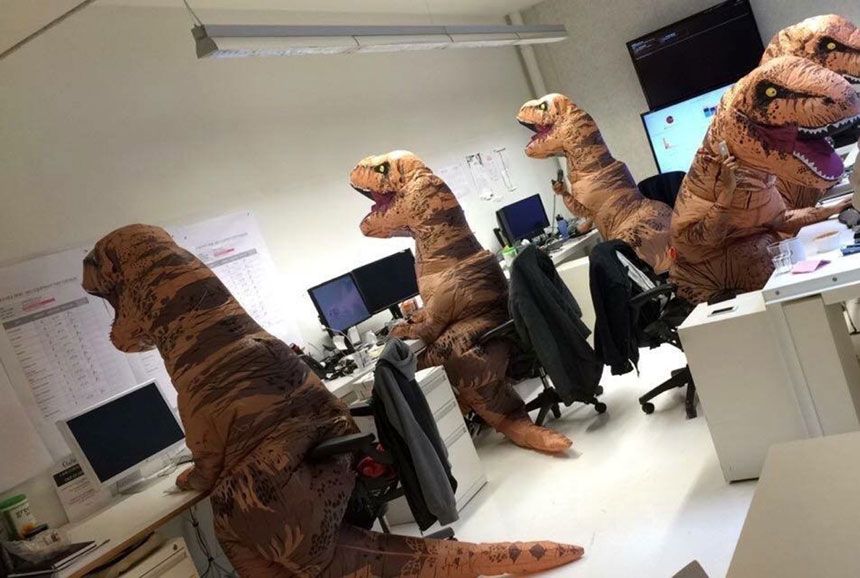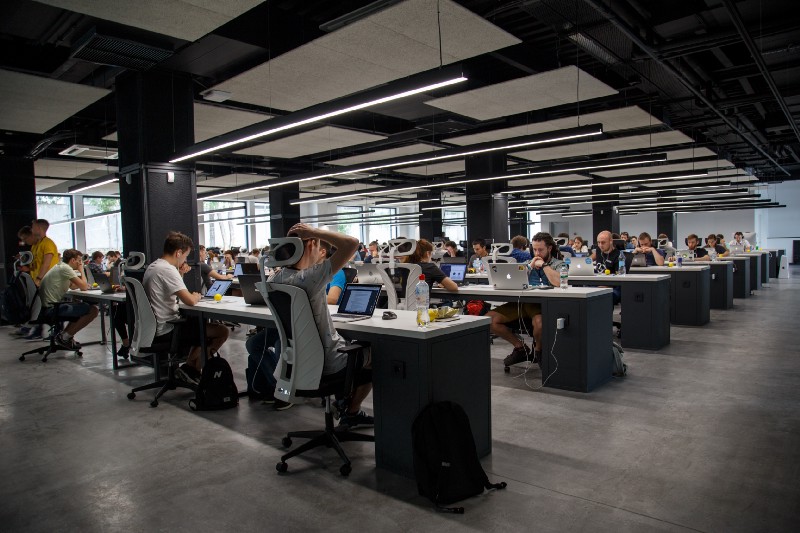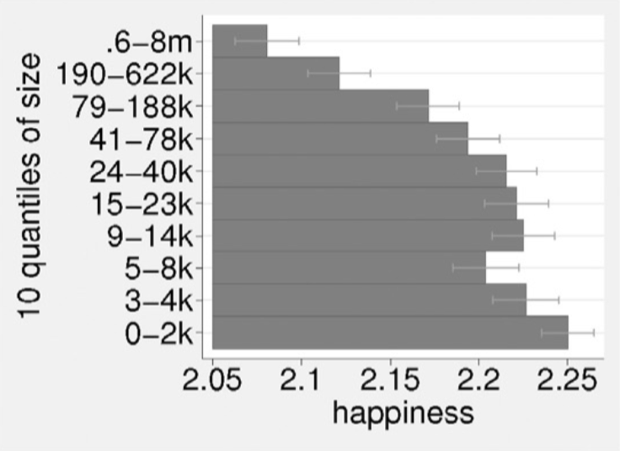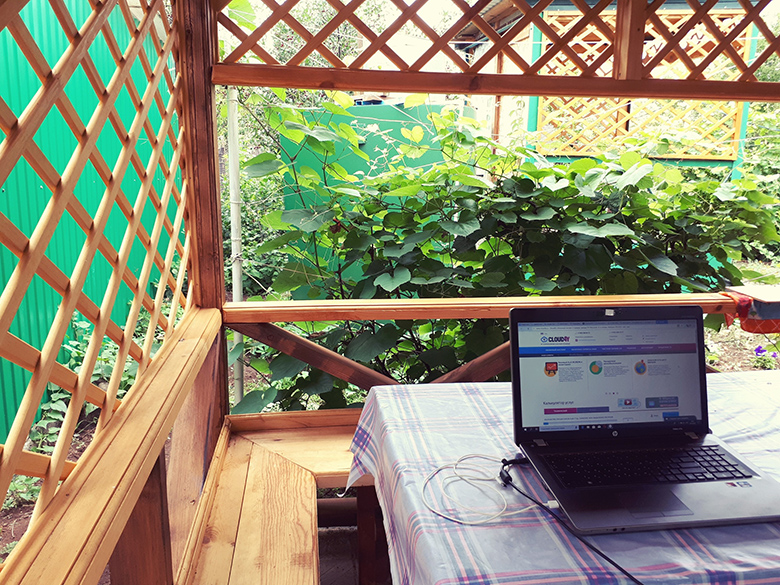Why working in IT is not so cool

Everyone seems to think that just because you work for an IT company, you spend all your days relaxing on colorful bean bags, eating free gourmet food, playing ping-pong, and sometimes writing some quick code which solves major problems.
I have worked in the IT industry for more than ten years and I will tell you, it was a crazy race filled with many ups and downs. More down than up, if I am really honest with you.
')
Here are just a few examples, based on my own experience, why working in the high-tech industry is not as good as most people think.
It demoralizes
Ready for a satisfying and inspiring day of great value that can change the world?
It is better to restrain your imagination, because a typical day working in an IT company may look something like this.
Wake up, get dressed and get to your office, which is 20-60 + minutes from your home. Roads and highways are already full of other people who are busy with the same. As soon as you finally reach the building where your office is located, you are locked in a cubicles, open-space or some other “public standard working container”, even if most of your real work can be done without permanently distracting other people's attention. .

Call it what you will, but all the office workers are stuck in the cement box for most of the day.
For 20% of your day, you are working on a microscopic task, which is part of a much larger project, of which you may be unaware of the true usefulness or duration. Another 80% of the time is spent on meaningless meetings, which follow the topics of an endless list of changes and improvements in your work, postponement of deadlines, or are devoted to explaining the reasons for the reduction in funding for your project in the next quarter.
At the end of the working day, you should hurry from the office in the hope of maximizing your time at home. Sorry, but the trip back is not better, because the roads are already filled with several thousand people competing with each other to get home before you. As soon as you return home, you will have several hours to eat, relax and chat with your family before going to bed and doing the same things again and again every day.

"Ugh" really
In the end, work in IT is the same heartbreaking work in a corporation.
Always new employees
IT # 1 in terms of staff turnover. Higher than the retail sector, which is well known for its traditionally high level of turnover.
This means that a retail employee who works overtime on the Christmas shift at Bloomingdales is more likely to stay at his company longer than a computer game programmer who will probably do two or three times more.
A high turnover rate also means that your colleagues, with whom you have developed deep relationships and are used to spending 8 hours a day with them, are more likely to replace your IT company with a more attractive job and will be replaced by someone new.
IT is always new people with different characters, working habits, a sense of humor, smells, food preferences and fads.
Given that you spend more time with people at work than with your loved ones at home, you need to get close with your colleagues, right?
Of course, this does not take into account the fact that you yourself can leave the current place and find a job in another company. Finding your place within an organization can be difficult, especially when you need to adapt to new cultures, standards and procedures.
In my experience, social relationships in the workplace are much more important than actual daily work. Remember, the people around are “comrades in the trenches”. People with whom you will need to share life stories and plans.
Developing good relationships takes time and effort. When people are constantly leaving, and you have to start building this relationship from scratch, this is difficult to achieve.
It is expensive
If you choose a Fortune 500 company to work, chances are high that you will need to live in or near a large city.
Perhaps it will be a city with a population of over 1 million people. A higher population size and density in developed countries, as a rule, equates to a much higher cost of living and lower overall happiness in such cities .

It may look good, but can you afford to live here?
The average rental price in Los Angeles is $ 2,200 + .
In San Francisco - $ 3,400 +.
If you decide that living in the city is too expensive, you can find accommodation in a nearby suburb just 45 minutes away. However, do not underestimate the psychological impact of daily trips on your motivation, creativity, and, most importantly, your time. Large technology companies understand this , and, for example, Facebook even offers bonuses for those living near their campus.
Work in IT will give you a 6-digit income that will solve all the problems? If you want to live like Ebenezer Scrooge, maybe. After you take into account the increased costs of food, clothing, fuel, utilities, taxes, and other things related to life in a big city, how much is really left?
In a study published in the journal Cities, Okulich-Kozarin explores the theme of dependence of the level of happiness of the population on the size of the settlement, defining a turning point in which the size of a city becomes too large and its inhabitants become unhappy. In this case, the study defines happiness in terms of “subjective well-being,” the general definition of happiness, which includes both satisfaction from life and mood.
Using data from a social survey of US residents for the years 1972-2012, the study showed that people in large cities are much less happy than neighbors from small ones. As shown in the figure below, happiness gradually increases as the population decreases. One of the notable exceptions is a sharp decline in the level of happiness in communities of about 5,000–8,000 people.

The study shows that subjective unhappiness increases when the population of the city reaches several hundred thousand people. The 60 cities in the United States with a population of over 300,000 are the least fortunate cities in the country. This led the researchers to conclude that “a person should not give up urban life in order to be happy, just to avoid the largest cities”.
The high tech industry doesn't care about you. And this is serious.
Do you think the technology industry is really concerned about creating consumer-friendly products and how it affects people's behavior or mental abilities?
The world's largest technology companies are developing platforms that create opportunities for consumption, but not in the way that we all hope for.
My experience in the field of technology is similar to working in a meat factory. Once you have seen how a hot dog is done from start to finish , you cannot see it. Most of the services that the industry focuses on (targeted advertising, eye-catching content, and the like) are not necessarily healthy or beneficial to their consumers. But to consume it is "tasty", so few people complain, and most continue to buy.
The distractions that flash before your eyes every day, dispel your attention and corrode the intellect. High-tech giants reach $ 1 trillion of market capitalization, which is more than the GDP of some countries. Not to mention the fact that they employ many of the best and brightest people from all over the world. Nevertheless, we are still struggling with impending problems, such as global warming, sustainable energy and healthy and healthy food.
Nowadays, it is difficult to take a few steps without checking your phone or not to be "online" at least to some extent. The technology that people have created is amazing and incredibly powerful, but we used it to use human psychology and our deepest desires to sell more things and services. Intentionally or not, technology companies have created new human addictions ( Internet Addiction Disorder ), which previously did not exist.
This addiction, which also feeds the motivation of the technology industry to invent new methods that are specifically designed to grab as much of your attention as possible, as long as possible. This is a vicious circle that we perpetuate not only for our generation, but also for future generations.

"Just a minute, I just need to check my email, stock portfolio, instafeed ..."
Of course, the Internet is full of useful information that we can all apply to enrich and beautify our lives. But how many of us actually use the Internet for this purpose? Most of the time on the Internet, users mostly consume content on social networks or streaming platforms that add little to our lives.
The high tech industry doesn't care about you. She just wants attention from you, which is enough for you to buy something.
Comment Cloud4Y
The author of the original publication expresses his opinion on a very specific topic - what are the disadvantages of working in IT? And the article contains the answer to this question.
Of course, if we list only the minuses, the pessimistic picture is written, written with bias. We believe that an article “Going to IT: what is good and what is bad is the industry of information technology” , posted on hh, gives a fairer and more universal assessment of the labor culture of the IT industry.
It may be “IT-glass is only half full,” but still the glass is not empty. Among the benefits:
High salaries
“A programmer is required, a salary of 100 thousand rubles” - for the most part of Russia such an announcement is a real dream job. For an IT person, this is an ordinary job offer with a regular salary for the industry.
Recent statistics from the service "My Circle" confirms this.
Growth opportunities
Applicants tend to see in information technology a large field of opportunities that is unlikely to grow weeds in the next couple of decades. Moreover, the prospect of the industry as a whole turns out to be even more important for them than concrete opportunities for developing their own career. Most likely, people value the freedom that the industry provides: here you can choose a company that is close in spirit, whether it is an international corporation or a small startup, and not worry about your professional growth.
Ability to work remotely
For IT workers, the remote is no future. A Russian IT pros today love to work from home a few thousand kilometers from the head office, without burdening themselves with relocation, traffic jams or crowding the subway, and the employer - creating a suitable work space for themselves.
We at Cloud4Y practice it ourselves.

Especially true in the summer.
Labor quality
It is characteristic that the employees of the IT sphere that have already taken place consider the main advantage not the high salary or career prospects, but their interest in work and satisfaction with current projects.
Without the drawbacks, this study would also be incomplete. Therefore, here.
1. Low start
High salaries are partially offset by the fact that starting a career in the IT field is not so easy. A novice developer of mobile apps for iOS in Russia receives less than the average courier (33,000 rubles per month against 36,000), and the salary of a novice Java programmer in Moscow is comparable to the salary of a metropolitan waiter (41,000 rubles a month).
2. High future competition
Despite the restoration of economic growth, the number of vacancies according to hh.ru in Russian IT companies in 2017 almost did not grow.
3. You have to constantly learn
As the leading figures say: “The first thing that a programmer must learn is that his training will never end.” By the way, one of the main factors of dissatisfaction with current work among IT specialists is the impossibility to combine it with personal life, and this also applies to regional specialists, who often work remotely.
4. Seated work

“Many IT employers compensate employees for the need to maintain a sedentary lifestyle by providing corporate discounts on classes in the gym. But unfortunately, there is nothing to compensate for the fall in vision by the age of 40 - this minus, as well as everything listed above, causes discontent. IT people are not so happy people, as one might think: about 40% of applicants are not averse to working in another area, and this is quite an average for the labor market, ”the researchers note.
Source: https://habr.com/ru/post/421685/
All Articles